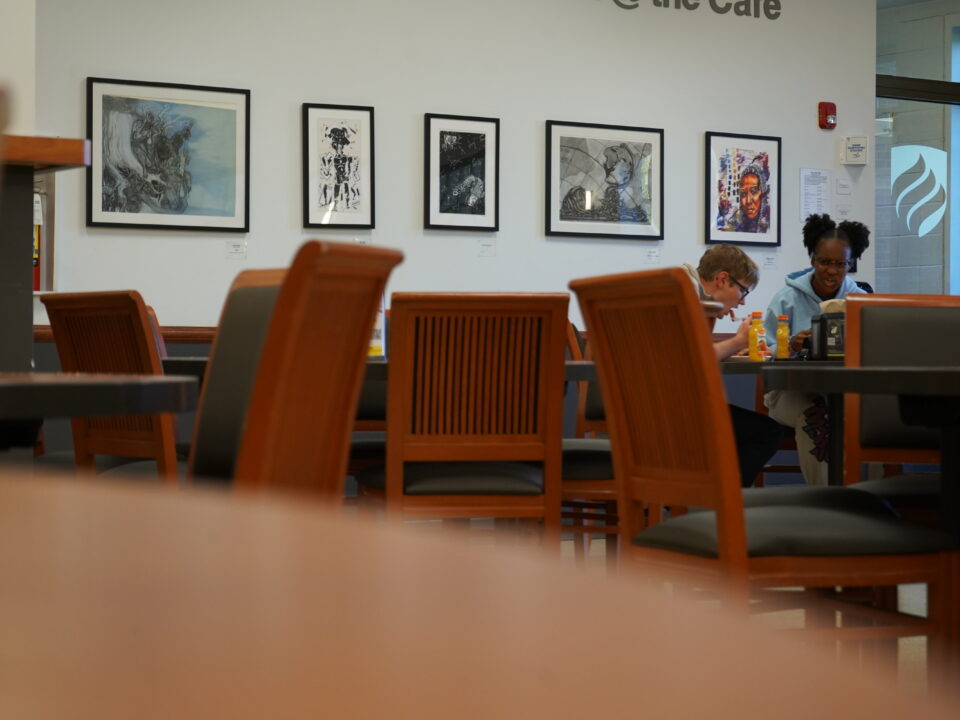Religious studies toting Christianity: what does that say about campus diversity?


Graphic by- Abbey Mark
It is safe to say that a lot of students have religious trauma, myself included.
Growing up, going to church every Sunday was normal for me. At the time, it seemed as if it was necessary, or that I would not be considered a good member of society if I didn’t go, even though I was a kid.
Sometimes my parents had to drag me to church, especially as I grew older. At the time, I did not know why, but there was always a negative emotion I felt toward worship.
So, leave it to me to transfer to Elmhurst University, a private school associated with the United Church of Christ.
At first, I did not mind going to a school that based a lot of its values on religion; I do think religion is a beautiful thing and can still appreciate it.
It was not until I took a religion course at EU that I regretted my decision to come to this school, as that semester turned out to be incredibly traumatic due to the course and discussions held within it.
As a part of course requirements, in order to graduate all EU students must take a course discussing religious studies in context.
Looking at the courses offered by EU for religious studies, it is a very limited course catalog with not many options for students to pick from if they are just trying to get a gen-ed done.
There is not even one 100-level course offered for students to get this credit. There are 15 200-level courses, 31 300-level courses, and three 400-level courses. This almost forces students into taking a 300-level course, which puts a lot of stress on the coursework.
EU needs to make a change to diversify its course catalog for students. Adding classes to the 100-level will help students just trying to get the credit done, and more 200-level courses can help give students a challenge but still have it be relatively easy.
There also needs to be more general religion courses on top of more courses that dive into other religions that are not Christianity or Catholicism.
I was never thrilled that I was taking a course called “The Problem of God” at the 300-level, but it seemed as if I had no other options.
Even briefly mentioning that I had a religious background subjected me to having to open up about my experiences with religion and my relationship with God.
It made me really dive into why I grew apart from religion, but religion is personal, and I was going through my own journey out loud in front of everyone during class discussions.
Is it ethically right to be having students share this vulnerable part of themselves with a classroom of peers?
In the class of about 25 students, we would all just sit together with the discomfort of the topics at hand and collectively regret our choice of coming to class that day.
However, for me, it seems as if I was subjected to the spotlight of my classmates, and had to deal with more discomfort as I would always be called after I shared parts of my religious background, and about myself.
A lot of my religious trauma stems from being gay and how people treat me due to that aspect of myself. There is always the debate about whether or not being gay is an ultimate sin, and it felt like every eye was on me every time sexuality was brought up.
I would be called out all the time. Students would tell me that, “God loves me no matter what,” and that, “Even though I am a sin, I will be forgiven.”
I experienced a lot of emotions, and it was hard for me to have my existence constantly be up for debate in that class. There was even a panel that I was a part of where fellow students had to discuss the issues with sexuality and religion, and I just sat there in silence.
No student should have to have their existence and rights debated in a class by their peers and professor. Elmhurst University needs to take steps to make sure that there is caution in these courses, and that professors are trained to have these conversations in a non-threatening way.
I do not believe that this requirement should be taken away; it just needs to be updated to represent the current trends of society. If EU is taking steps forward to be an all-inclusive institution, they need to make the same steps forward with their courses.


